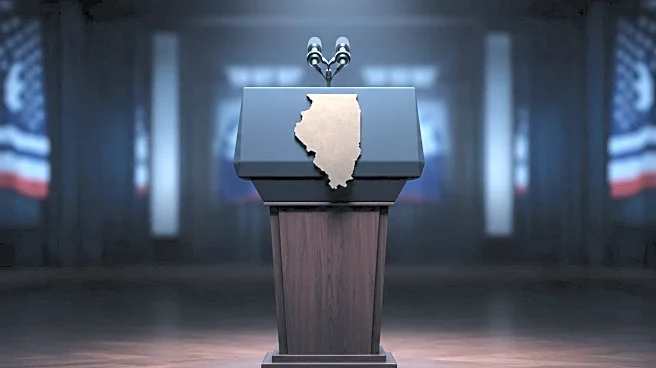What's Happening?
Governor JB Pritzker of Illinois has indicated he may seek the Democratic nomination for president in 2028, while simultaneously running for a third term as governor. During an appearance on NBC's 'Meet The Press,' Pritzker criticized a Republican-led effort to redraw Texas congressional districts, labeling it unconstitutional for violating federal voting protections. Pritzker has been active in national Democratic circles, hosting Texas House Democrats who fled to Illinois to block the GOP's redistricting plan. Despite not officially declaring a presidential run, Pritzker's national engagements have fueled speculation about his ambitions. Illinois Republicans have accused him of prioritizing personal political goals over state issues, yet they have not presented a strong challenger for the upcoming gubernatorial race.
Why It's Important?
Pritzker's potential presidential bid could significantly impact the Democratic landscape, especially given his financial resources and political influence. His criticism of Texas's redistricting efforts highlights ongoing national debates over voting rights and gerrymandering. The situation in Texas, where Democrats have fled to prevent a quorum, underscores the contentious nature of redistricting and its implications for minority representation. Pritzker's involvement raises his profile as a defender of voting rights, potentially appealing to a broader national audience. The outcome of these redistricting battles could affect the balance of power in Congress, influencing legislative priorities and party strategies.
What's Next?
The Texas legislative session, aimed at passing the new congressional map, is set to end on August 19, but Governor Greg Abbott has vowed to call successive special sessions until Democrats return. This prolonged standoff could lead to legal challenges and further political maneuvering. Pritzker's decision on a presidential run will likely depend on the political climate and his success in the gubernatorial race. Meanwhile, the national conversation on voting rights and redistricting is expected to intensify, with potential federal interventions or legislative actions to address these issues.
Beyond the Headlines
The ethical and legal dimensions of redistricting are complex, involving interpretations of the Voting Rights Act and constitutional protections. Pritzker's stance reflects broader concerns about democratic integrity and minority representation. The situation in Texas may prompt other states to reconsider their redistricting processes, potentially leading to reforms or increased federal oversight. The political dynamics in Illinois, with Pritzker's dual focus on state and national issues, illustrate the challenges of balancing local governance with broader ambitions.









